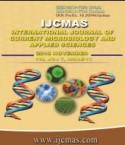


 National Academy of Agricultural Sciences (NAAS)
National Academy of Agricultural Sciences (NAAS)

|
PRINT ISSN : 2319-7692
Online ISSN : 2319-7706 Issues : 12 per year Publisher : Excellent Publishers Email : editorijcmas@gmail.com / submit@ijcmas.com Editor-in-chief: Dr.M.Prakash Index Copernicus ICV 2018: 95.39 NAAS RATING 2020: 5.38 |
Both biotic and abiotic stresses are major constrains to agricultural production. Under stress conditions, plant growth is affected by a number of factors such as hormonal and nutritional imbalance, ion toxicity, physiological disorders, susceptibility to diseases, etc. Plant growth under stress conditions may be enhanced by the application of microbial inoculation including plant growth promoting rhizobacteria (PGPR). These microbes can promote plant growth by regulating nutritional and hormonal balance, producing plant growth regulators, solubilizing nutrients and inducing resistance against plant pathogens. The present study had the objectives, screening the exopolysaccharide (EPS) producing bacteria from PGPR isolates and evaluating the effect of exopolysaccharide (EPS) producing bacteria on growth of Okra plants. Seven bacterial strains were collected from culture bank and tested for their drought tolerance, PGPR traits and EPS production. Out of seven cultures Pseudomonas aeruginosa and Bacillus coagulans were found to be best. Okra seeds were treated with different combination of EPS producing bacteria and shown in field. Maximum seed germination was observed in T7 (79.15%). Maximum plant height at each time interval was attained in treatment T7 (6cm, 13.5cm, 15.8cm, 18.43cm and 22.93cm respectively). Maximum Number of leaves per plant at each time interval was attained in treatment T7 (4.33, 6.33, 8.33, 10.33 and 10.66 respectively). Maximum leaf area graphically was observed in treatment T7 (181.89 cm2). Maximum root length was observed in treatment T7 (16.56 cm). Maximum fresh weight and dry weight of root per plant was observed in treatment T7 (7.83gm, 1.65gm respectively). Maximum fresh and dry weight of leaf per plant was observed in treatment T7 (4.70gm, 0.86gm respectively).
 |
 |
 |
 |
 |